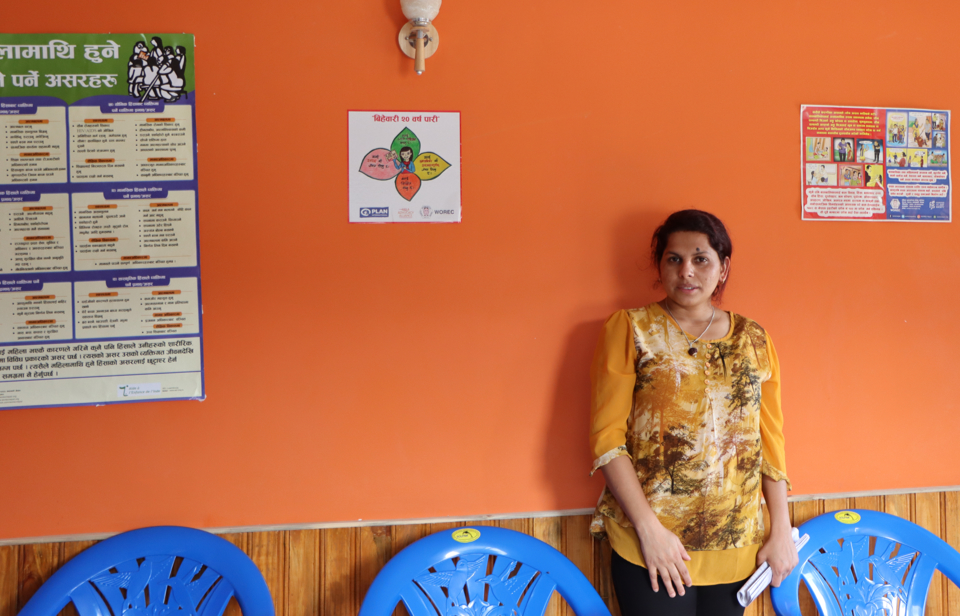From Where I stand: “I am listening, I am with you.”
Sabina Rimal is the Program Officer at Women's Rehabilitation Centre (WOREC) Nepal, an organization working for the protection and promotion of women’s human rights. In her role, Rimal counsels survivors of gender-based violence (GBV) and manages supervision of psycho-social counseling sessions and coordination of safe houses across WOREC‘s network in Nepal. Currently, WOREC is working in 16 communities in Nepal and has catered to over 800 survivors of GBV during three-months-long COVID-19 lockdown in Nepal.Date:

![]()
My phone vibrated, and an unknown phone number flashes on the screen. I slid to answer, but even before I said hello, I hear sobbing. I say, "I am listening, I am with you". Sometimes it is a relief for survivors to express their emotions without inhibitions. A few minutes later, the woman on the phone told me that her husband brutally hit her when she refused to give him more money. In normal circumstances, I would urge the survivor to immediately come to our safe house. But the entire nation is under lockdown, and she is stuck at home with her husband.
Over the next few days Gyanu* called me whenever her husband was not around. We discussed ways for Gyanu to process her emotions, made plans on safe places to go to if her husband gets violent again. With time Gyanu and I developed a strong bond. She felt confident that I can support her to heal and that I can be a trusted witness if she decides to have legal proceedings. Time and again I worry about her like I would for my own family, especially when Gyanu does not call.
Phone calls such as Gyanu's have increased drastically during the COVID-19 lockdown in Nepal. The Government imposed nationwide lockdown from 23 March till 21 July to prevent the spread of the virus. There are times when I speak to more than six survivors a day on our hotline. It is challenging when phone calls are the only option to aid survivors during lockdown. If their lives are at risk, I coordinate with local governments to ensure they have access to safe houses closest to their homes. Our data at WOREC shows an average of seven murder cases every month since the lockdown in Nepal.
Other challenges that are part of working for women's rights also persist. Community members are initially encouraging of women who seek help from our organization. However, as they start speaking up against injustices, the community becomes intolerant and push back. The survivors of GBV are criticized for being “too outspoken” and our supportive interventions are labeled as “a ploy to break families”. It is very frustrating to deal with biases of people in positions of power and not uncommon for the police o judges to blame victims for their situation and pressure them to forgive their perpetrators. Even when systems are in place, I need to hold them accountable to do what is right.
It is easy to feel hopeless, but I dedicate time to look after myself. When I am not counseling, I love tending to my garden. Speaking to my plants and dancing with them gives me solace. I also never compromise on my sleep and try to drink as much water as I can.
Had it not been for my family's support, I doubt if I would have followed my dreams of trying to change society. As farmers, my parents were determined to give me the education they did not receive. I would walk an hour every day to reach the school in my village. My parents went against the norm advocating for me to master not only domestic chores but also to embrace the outside world. My hope is to provide Gyanu and other survivors access to means to overcome all forms of violence in their lives and lead a dignified life.”
In efforts to end all forms of violence against women and girls, UN Women partners with WOREC to train counselors on supporting cases of GBV, to ensure survivors of GBV have access to services and to run national radio campaigns against GBV. In response to the increasing cases of GBV during COVID-19 pandemic, UN Women has supported WOREC with relief supplies as well as logistic support to monitor quarantine centers from gender lens.
* Name of the survivor is changed to protect identity.